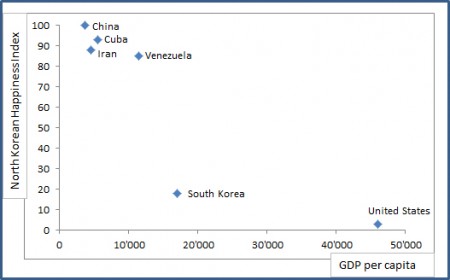
It’s official: China is the happiest country on earth. North Korea comes a close second, while the American Empire (the U.S.) ranks at the bottom of the list. That’s according to a Happiness Index released by – surprise! – the Democratic People’s Republic of Korea. For anyone outside Kim Jong-il’s monopoly of information, the index is a surreal and somewhat comical attempt to legitimize the government’s performance. The idea of measuring happiness in general, however, is not quite as far-fetched.
Indices like GDP per capita continue to dominate national debates about social and economic progress, but critics of this practice are no longer ridiculed. Traditional gauges of prosperity are seriously flawed; they do not, for example, take into account environmental degradation or the exhaustion of natural resources. And that’s only part of the problem. The more important argument is that measures such as the GDP disregard most factors that make life worth living.
The Economist has recently launched a debate about whether or not new measures of economic and social progress are needed for 21st century economies. Proposing the motion, Emeritus Professor of Economics Richard Layard argued that quality of life, as people actually experience it, must be a key measure of progress and a central objective for any government. An overwhelming majority of the readers agreed.
There have been repeated attempts at integrating such measures. Some recent ones include efforts by the British coalition government to measure quality of life by asking people how happy or anxious they have been feeling lately; or the OECD’s Better Life Index that allows users to set their own preferences when comparing well-being across countries.
Fortunately, the blind assumption that a higher GDP automatically translates into benefits for everyone is a thing of the past. Still, we’re a long way from finding an objective and widely accepted alternative to monitor economic and social progress. It’s important to keep in mind that any such index can’t and won’t be perfect. But—as the persistence of GDP has demonstrated—imperfect indices can become quite popular.

